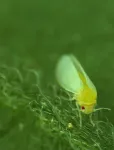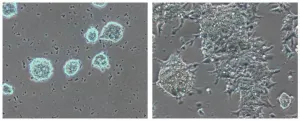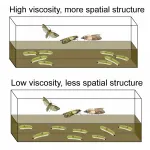(Press-News.org) Millions of years ago, aphid-like insects called whiteflies incorporated a portion of DNA from plants into their genome. A Chinese research team, publishing March 25th in the journal Cell, reveals that whiteflies use this stolen gene to degrade common toxins plants use to defend themselves against insects, allowing the whitefly to feed on the plants safely.
"This seems to be the first recorded example of the horizontal gene transfer of a functional gene from a plant into an insect," says co-author Ted Turlings (@FARCE_lab), a chemical ecologist and entomologist at the University of Neuchâtel, in Switzerland. "You cannot find this gene, BtPMaT1, which neutralizes toxic compounds produced by the plant, in any other insect species."
Scientists believe that plants probably use BtPMaT1 within their own cells to store their noxious compounds in a harmless form, so the plant doesn't poison itself. The team, led by Youjun Zhang from the Institute of Vegetables and Flowers at the Chinese Academy of Agricultural Sciences, used a combination of genetic and phylogenetic analyses, to reveal that roughly 35 million years ago, whiteflies stole this defense gene, granting the insect the ability to detoxify these compounds for themselves.
"We think a virus within the plant may have taken up this BtPMaT1 gene and, after ingestion by a whitefly, the virus then must have done something inside the insect whereby that gene was integrated into the whiteflies genome," says Turlings. "Of course, this is an extremely unlikely event, but if you think about millions of years and billions of individual insects, viruses, and plants across time, once in a while this could happen, and if the acquired gene is a benefit to the insects, then it will be evolutionarily favored and may spread."
Whiteflies have become a major agricultural pest worldwide, able to attack at least 600 different species of plants worldwide. "One of the questions we've been asking ourselves is how these insects acquired these incredible adaptations to circumvent plant defenses, and with this discovery we have revealed at least one reason as to why," Turlings says.
Using this knowledge, Turlings' Chinese colleagues created a strategy to undo the whiteflies' stolen superpower. They developed a small RNA molecule that interferes with the whiteflies' BtPMaT1 gene, making the whiteflies susceptible to the plant's toxic compounds.
"The most exciting step of this design was when our colleagues genetically manipulated tomato plants to start producing this RNA molecule" says Turlings. "Once the whiteflies fed on the tomatoes and ingested the plant-produced RNA, their BtPMaT1 gene was silenced, causing 100% mortality of the insect, but the genetic manipulation had no impact on the survival of other insects that were tested."
With focused efforts to produce genetically modified crops that are able to silence the whitefly gene, this could function as a targeted strategy for pest control to combat agricultural devastation caused by whitefly populations.
"There are definitely still some hurdles this method needs to get over, most notably the skepticism about using transgenic plants," he says "But in the future, I do see this as a very clear way of controlling whiteflies because now we know exactly the mechanism behind it, and we are equipped to deal with possible changes in the whitefly gene that may arise.
INFORMATION:
This research was supported by the National Key R & D Program of China, the National Natural Science Foundation of China, the China Agriculture Research System, the Beijing Key Laboratory for Pest Control and Sustainable Cultivation of Vegetables, and the Science and Technology Innovation Program of the Chinese Academy of Agricultural Sciences.
Cell, Xia et al.: "Whitefly hijacks a plant detoxification gene that neutralizes plant toxins" https://www.cell.com/cell/fulltext/S0092-8674(21)00164-1
Cell (@CellCellPress), the flagship journal of Cell Press, is a bimonthly journal that publishes findings of unusual significance in any area of experimental biology, including but not limited to cell biology, molecular biology, neuroscience, immunology, virology and microbiology, cancer, human genetics, systems biology, signaling, and disease mechanisms and therapeutics. Visit: http://www.cell.com/cell. To receive Cell Press media alerts, contact press@cell.com.
Octopuses are known to sleep and to change color while they do it. Now, a study publishing March 25 in the journal iScience finds that these color changes are characteristic of two major alternating sleep states: an "active sleep" stage and a "quiet sleep" stage. The researchers say that the findings have implications for the evolution of sleep and might indicate that it's possible for octopuses to experience something akin to dreams.
Scientists used to think that only mammals and birds had two sleep states. More recently, it was shown that some reptiles also show non-REM and REM sleep. A REM-like sleep state was reported ...
More than half of the opioid tablets prescribed for patients who underwent orthopaedic or urologic procedures went unused in a new study by researchers at the Perelman School of Medicine at the University of Pennsylvania. Using an automated text messaging system that regularly checked in with patients on their pain and opioid use, the study also showed that most opioids are taken within the first few days following a procedure and may not be necessary to manage pain even just a week following a procedure. The study was published today in JAMA Network Open.
"Through simple text messaging we highlight a method which gives clinicians the information they need to reduce prescribing and manage ...
BOSTON - In the largest study of its kind to date, researchers at Massachusetts General Hospital, Brigham and Women's Hospital and the Ragon Institute of MGH, MIT and Harvard have found the new mRNA COVID-19 vaccines to be highly effective in producing antibodies against the SARS-CoV-2 virus in pregnant and lactating women. They also demonstrated the vaccines confer protective immunity to newborns through breastmilk and the placenta.
The study, published in the American Journal of Obstetrics and Gynecology (AJOG), looked at 131 women of reproductive age (84 pregnant, 31 lactating and 16 non-pregnant), ...
Chronic side effects among melanoma survivors after treatment with anti-PD-1 immunotherapies are more common than previously recognized, according to a study published March 25 in JAMA Oncology.
The chronic complications, which occurred in 43% of patients, affected the joints and endocrine system most commonly, and less often involved salivary glands, eyes, peripheral nerves and other organs. These complications may be long lasting, with only 14% of cases having been resolved at last follow-up. This finding contrasted with previously reported immunotherapy-related acute complications that affected visceral organs -- including the liver, colon, lungs and kidneys -- which were effectively treated with steroids. However, the vast ...
Pregnant women who consumed the caffeine equivalent of as little as half a cup of coffee a day on average had slightly smaller babies than pregnant women who did not consume caffeinated beverages, according to a study by researchers at the National Institutes of Health. The researchers found corresponding reductions in size and lean body mass for infants whose mothers consumed below the 200 milligrams of caffeine per day--about two cups of coffee--believed to increase risks to the fetus. Smaller birth size can place infants at higher risk of obesity, heart ...
Scientists at the Proteomics Core Unit of the Spanish National Cancer Research Centre (CNIO), headed by Javier Muñoz, have described the mechanisms, unknown to date, involved in maintaining embryonic stem cells in the best possible state for their use in regenerative medicine. Their results, published in Nature Communications, will help to find novel stem-cell therapies for brain stroke, heart disease or neurodegenerative conditions like Alzheimer's or Parkinson's disease.
Naïve pluripotent stem cells, ideal for doing research
Embryonic stem cells (ESCs) are pluripotent cells that can grow ...
Quantum holds the promise of increasing the power of sensing technologies. While the field of quantum sensing has shown a lot of potential for detecting very small signals, the ability to truly optimize these sensors has been thwarted by the complexity of control schemes.
In a paper published on March 25 in Nature Partner Journals - Quantum Information, a research team based at the Johns Hopkins University Applied Physics Laboratory (APL) in Laurel, Maryland, explained how they applied two theoretical tools of quantum information to these types of extremely sensitive signal detection tasks. Their research suggests that honing this sensitivity to detect signals while rejecting background noise will enable the use of quantum ...
HOUSTON - (March 25, 2021) - One of nature's most prolific cannibals could be hiding in your pantry, and biologists have used it to show how social structure affects the evolution of selfish behavior.
Researchers revealed that less selfish behavior evolved under living conditions that forced individuals to interact more frequently with siblings. While the finding was verified with insect experiments, Rice University biologist Volker Rudolf said the evolutionary principal could be applied to study any species, including humans.
In a study published online this week in Ecology Letters, Rudolf, longtime collaborator Mike Boots of the University of California, Berkeley, and colleagues showed they could drive the evolution of cannibalism in ...
An 'astonishing' deficit of data about how the global boom in educational technology could help pupils with disabilities in low and middle-income countries has been highlighted in a new report.
Despite widespread optimism that educational technology, or 'EdTech', can help to level the playing field for young people with disabilities, the study found a significant shortage of evidence about which innovations are best-positioned to help which children, and why; specifically in low-income contexts.
The review also found that many teachers lack training on how to use new technology, or are reluctant to do so.
The ...
Fish oil supplements are a billion-dollar industry built on a foundation of purported, but not proven, health benefits. Now, new research from a team led by a University of Georgia scientist indicates that taking fish oil only provides health benefits if you have the right genetic makeup.
The study, led by Kaixiong Ye and published in PLOS Genetics, focused on fish oil (and the omega-3 fatty acids it contains) and its effect on triglycerides, a type of fat in the blood and a biomarker for cardiovascular disease.
"We've known for a few decades that a higher level of omega-3 fatty acids in the blood is associated with a lower risk of heart disease," said Ye, assistant professor ...


